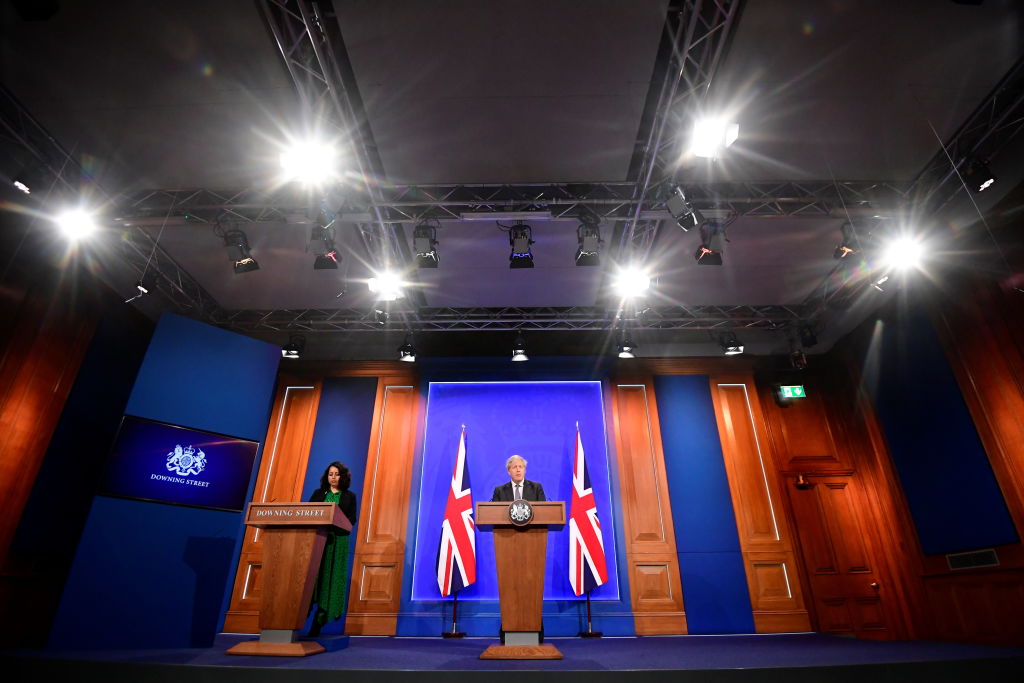It may have been drowned out by the collapse of the European Super League last night, but for the government’s critics, the decision to keep No. 10’s expensive new TV studio while scrapping the press conferences that were supposed to go with it, has become the worst combination of government profligacy and unaccountability. Even so, as a former special adviser in government, I think No. 10 are right not to go ahead with the televised press briefings.
When the Prime Minister gave his first press conference from the new No. 9 studio a few weeks ago, at first glance I assumed he must be away at a summit somewhere. The backdrop looked far too professional for the UK government. Our country is run from a 17th century terraced house and when foreign statesmen visit, we pull out dusty chairs from a closet and put them in front of a couple of roller banners in the dining room. So while it’s hard to see where the £2.6 million spent on the new Downing Street press room went, it does at least bring some professionalism to government events.
But putting the financial costs of the venue to one side, from a government comms point of view, proceeding with daily press conferences from Downing Street would have had a much more significant political price.
For most people, freedom from lockdown will also mean freedom from having to care about what politicians think and say
The scheme didn’t make much sense for the Conservatives at the moment. A government in a strong strategic position like the current administration doesn’t benefit from getting into daily fights – especially in the first half of the electoral cycle. The press conferences may well have been a useful weapon during the daily Brexit skirmishes, and the ministerial equivalent was certainly a useful tool during Covid’s crisis period. But in general the public is tired of division and permanent war, and will be tired of having to care about government press conferences.
These briefings would have increased government accountability to some extent – despite being hosted by an unelected adviser – but I’m not convinced they would have been healthy for our politics either. Imagine having the equivalent of a PMQs every single weekday. Canada and Australia do – and from working in both, I’ve seen how the daily spectacle leads ministers to spend most of their mornings thinking tactically in preparation, and the media to report more trivially. It’s perhaps no coincidence that centre-right governments in both countries have actively tried to use their comms grid to slow down the tempo of politics rather than speeding it up. Ideologically, small-state conservatives could also argue against creating incentives for constant reactive actions from the state.
The best card the Prime Minister currently holds is that he is still being seen as the leader of a recently-elected government rather than an 11-year old one. 2020 may have felt more like a dog year than a human one, but polls suggest that he has now survived this crisis strongly enough to be able to reset the government – however he likes. In the modern Twittercycle of news it may be futile to try to reduce the number of official announcements and reactions expected by the press, but the government at least shouldn’t seek to stoke the fire. Boris Johnson doesn’t need to wage a forever-war of attrition when the opposition is weak; a culture war should be seen as something that is reluctantly fought back against, and a war on the media just gets tiring.
For most people, freedom from lockdown will also mean freedom from having to care about what politicians think and say every day. It’s been so refreshing in the last couple of days to have the news cycle dominated by the governance of football rather than the antics of SW1.
In peacetime Westminster politics is ultimately more noise than signal – like Burke’s description of a dozen grasshoppers ‘making the field ring with their importunate chink… whilst thousands of great cattle, reposed beneath the shadow of the British oak, chew the cud and are silent.’ We’ll be a happier nation if we can start tuning out more of that noise. When Britain was focused on building back better in the late 1940s, I doubt neighbours would have huddled around the wireless every night to hear the latest housebuilding numbers from Whitehall.
It may seem counter-intuitive, but the government should perhaps have a strategic objective in the next couple of years of keeping political policy issues outside of the top two slots in the broadcast running order, apart from when making major Monday morning announcements and commenting on inevitable reactive scandals.
Psychologically transitioning the country from a period of political war and pandemic mode to a period of political peacetime and quiet competence would be an achievement in itself. And it would suit Boris’s natural disposition well – despite being obsessed with Churchill, he is a reluctant wartime leader. So let people chew the cud in peace for a while, there’s plenty of time to stir up the grasshoppers before 2024.






Comments